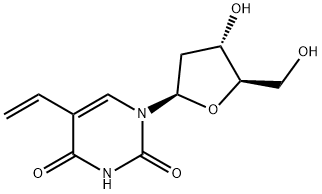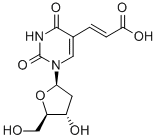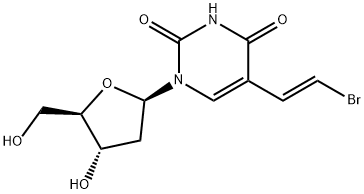5-vinyl-2'-deoxyuridine , 98% by HPLC , 55520-67-7
PRODUCT Properties
| Melting point: | 106-110 °C (decomp) |
| Boiling point: | 397.45°C (rough estimate) |
| Density | 1.2983 (rough estimate) |
| refractive index | 1.5700 (estimate) |
| solubility | soluble in DMSO |
| pka | 9.07±0.10(Predicted) |
| form | Solid |
| Appearance | yellowish solid |
Description and Uses
VdU (5-Vinyl-2’-deoxyuridine) is a synthetic analog of thymidine that can be used to study de novo DNA synthesis and cell proliferation. It is a potential replacement for BrdU (5-Bromo-2’-deoxyuridine) or EdU (5-Ethynyl-2’-deoxyuridine).
VdU incorporates into replicating DNA during the S-phase of the cell cycle instead of natural thymidine. The resulting vinyl-functionalized DNA can be detected by introducing either a biotin or fluorescent dye group via a cooper-free alkene-tetrazine reaction (also known as Inverse electron demand Diels-Alder ligation or IEDDA) and used for subsequent DNA purification or cell imaging tasks.
5-Vinyl-2'-deoxyuridine (5-VINYL-DURD), a thymidine analogue, is incorporated into cellular DNA during DNA replication. 5-Vinyl-2'-deoxyuridine is a click chemistry reagent, it contains an Alkyne group and induces DNA damage leads to apoptosis in human cultured cells[1].



![5''-DMT-5-[N-(6-Aminohexyl)-3-E-acrylamido]-2''-deoxyuridine](https://img.chemicalbook.com/CAS/GIF/252337-60-3.gif)

![(E)-5-[2-(2-CARBOXYVINYL)]-2'-DEOXYURIDINE N-HYDROXY-SUCCIMIDE ESTER](https://img.chemicalbook.com/CAS/GIF/869355-24-8.gif)